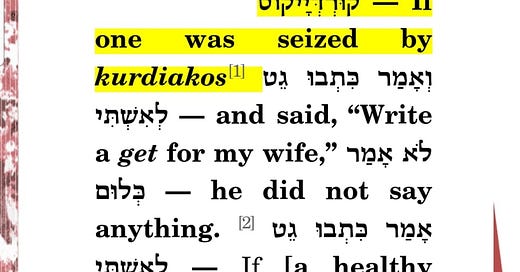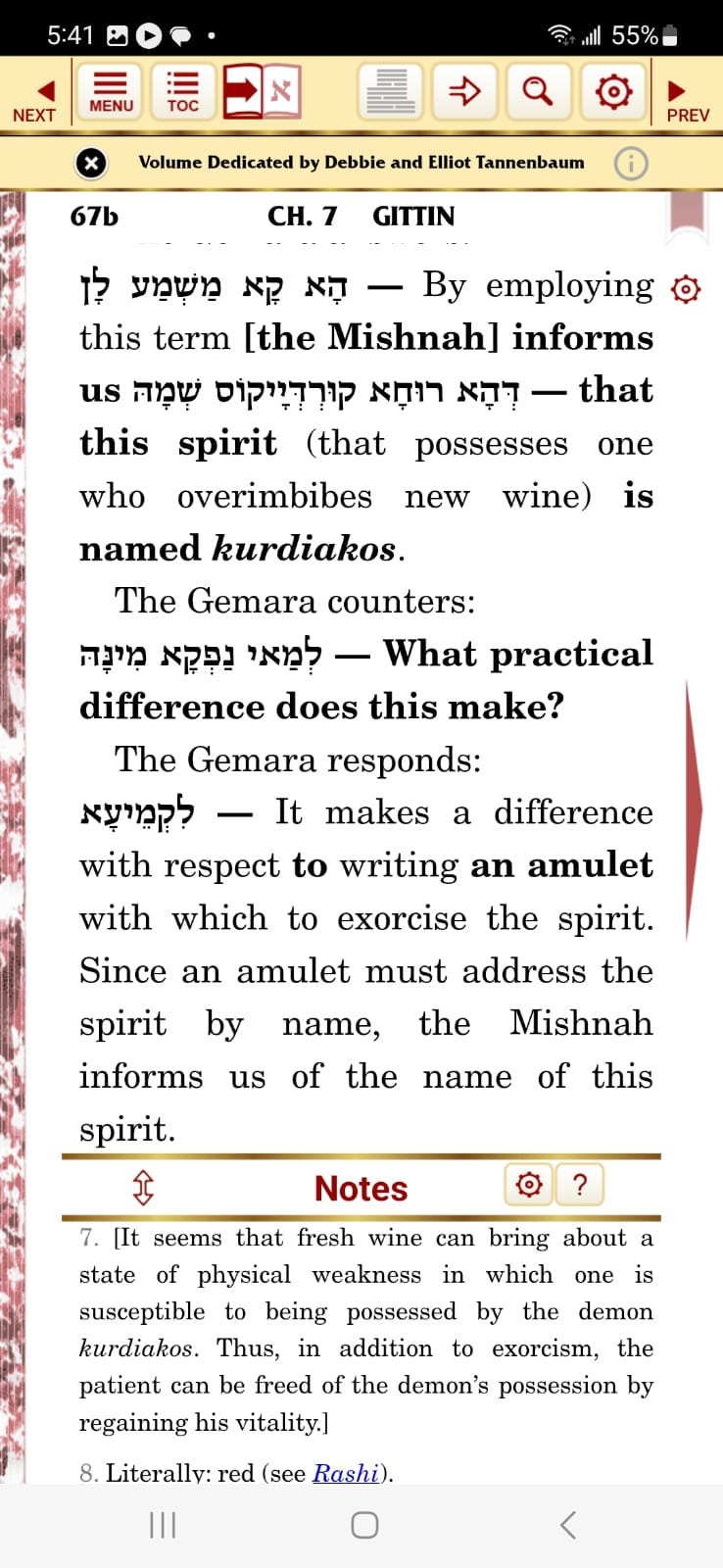Artscroll vs. Steinsaltz vs. English Koren on Kordaykus
A short while ago, we began the seventh perek of Gittin. Rav Steinsaltz has it (Gittin 67b):
מִי שֶׁאֲחָזוֹ קוּרְדְּיָיקוֹס, וְאָמַר: ״כִּתְבוּ גֵּט לְאִשְׁתִּי״ – לֹא אָמַר כְּלוּם. אָמַר: ״כִּתְבוּ גֵּט לְאִשְׁתִּי״, וַאֲחָזוֹ קוּרְדְּיָיקוֹס, וְחָזַר וְאָמַר: ״לֹא תִּכְתְּבֶנּוּ״ – אֵין דְּבָרָיו הָאַחֲרוֹנִים כְּלוּם.
MISHNA: In the case of one who was afflicted with temporary insanity [kordeyakos] and said: Write a bill of divorce for my wife, he said nothing, because he was not lucid at the time. If he said: Write a bill of divorce for my wife, when he was lucid, and was then afflicted with temporary insanity and he retracted his previous statement and said: Do not write it, his latter statement is considered to be nothing, i.e., it is not halakhically valid.
Or, in the original Hebrew commentary:
א משנה מי שאחזו (תקפו) קורדייקוס שהוא מין שיגעון התוקף אנשים לזמן מסויים, ואמר: "כתבו גט לאשתי" — לא אמר כלום, אין משמעות לדבריו, לפי שאין דעתו צלולה באותו זמן. אם אמר: "כתבו גט לאשתי" בדעה צלולה ואחרי כן אחזו קורדייקוס וחזר ואמר באותו זמן: "לא תכתבנו" — אין דבריו האחרונים כלום.
Thus, at the outset, he translates kordeyakos in a natural manner, as a kind of temporary insanity. This follows a Rambam approach.
We can contrast that to how Artscroll handles it. At the outside, they leave the word in the Mishnah untranslated, throughout.
They leave the actual translation to a footnote, with Rashi / demon and Rambam / seizure as possibilities. In this way, the Mishnah remains ambiguous, and they neither have to explicitly write what seems superstitious nonsense in the main body of text, nor the Maimonidean heretical-seeming answer in that main body of text.
But what about when kordaikos appears in the gemara, where a meaning is needed? The Steinsaltz text runs with their medical explanation, or maybe not. Thus,
in the English it is called a ruach ra’ah, which could be ambiguous — Rambam refers to ruach ra’ah as melancholy. The English translation renders that ruach as demon, unambiguously.
See what Rav Steinsaltz wrote in the continuation, and compare his words (Hebrew) to the English translation:
He explains in Hebrew that when writing an amulet, you need to know the name of the machalah, the malady. The English repeatedly inserts demons into the picture. Something seems to have been lost in translation.
What about Artscroll? They also run with spirits and exorcisms, in both main translated texts and footnotes:
We must admit, it is easier to run with the spirit / demon explanation through this portion of the gemara. Meiri cites Rambam as it being an illness, but doesn’t actually work to explain each portion of the gemara in accordance with that, the way Rav Steinsaltz did.







